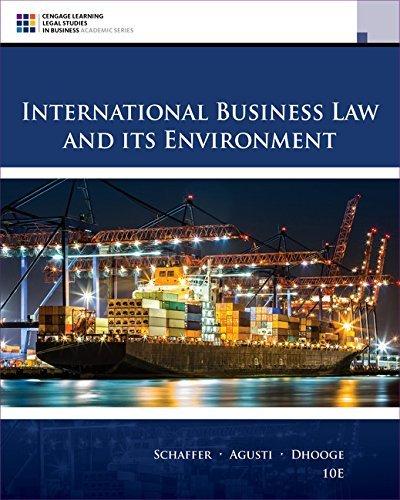Question:
NAFT was a New York
corporation engaged in the business of importing electronic equipment. In 1994, NAFT purchased $1.8 million in goods from Huston Electronics Company, a Taiwanese
corporation. Huston was affiliated with C.M. Hung Company from which it had purchased $400 million of goods over a seven-year period of time. NAFT typically made payments to C.M. Hung by means of letters of credit opened with Barclays Bank. These letters of credit required the seller to present certain documents to Barclays in order to receive payment. In 1993, Chiao Tung, a Taiwanese bank, became involved in these transactions. Chiao Tung made payments to Huston, obtained the required documentation, and presented the documentation to Barclays to obtain reimbursement pursuant to the letters of credit. In the 1994 transaction, Chiao Tung paid $1.8 million to Huston and sought reimbursement from Barclays pursuant to letters of credit, which NAFT had opened to cover the price of the goods. Barclays denied payment to Chiao Tung on the ground that Chiao Tung had failed to provide inspection certificates that were required by the terms of the letters of credit. Chiao Tung responded that its payment to Huston was made in reliance on the fact that inspection certificates were missing in over 40 prior transactions involving Huston and Chiao Tung, yet Barclays reimbursed Chiao Tung on each of those prior occasions because the inspection certificates were eventually supplied, or because NAFT waived the requirement. Huston and Chiao Tung subsequently declined to forward the original bills of lading for the disputed goods to NAFT and instructed Maersk, Inc., one of the carriers, to seize the goods. This action prompted NAFT to commence litigation against Huston, Chiao Tung and Maersk to prevent removal of the goods from the United States. Chiao Tung filed counterclaims against NAFT alleging that NAFT had improperly received the goods without paying for them. Should past waivers of documentary discrepancies serve to waive the right to insist on strict compliance with respect to subsequent transactions? Why or why not? What relevance, if any, should a course of dealing have on the requirement of strict compliance with the terms of letters of credit?
Corporation
A Corporation is a legal form of business that is separate from its owner. In other words, a corporation is a business or organization formed by a group of people, and its right and liabilities separate from those of the individuals involved. It may...







